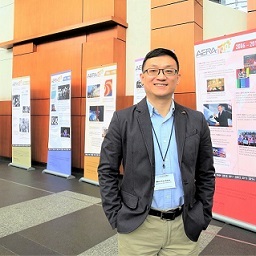Shared leadership, trust levels key to school performance

To recognize educators who have used their leadership to full effect, the Ministry of Education's K-12 Education Administration organizes the "Excellent Principal & Teacher Awards" on an annual basis. This year's winners selected from a pool comprising candidates applying from 64 schools (high school or lower) and 104 academic teams based in Taiwan will be announced in October.
While participants are awaiting the announcement, one might ponder: how can principals and teachers, as distinct sources of learning-centered leadership, exert impact and boost school performance? The paper "How principal leadership facilitates teacher learning through teacher leadership: Determining the critical path" published in "Educational Management Administration & Leadership" by Chen Wen-yan (陳文彥), an associate professor and chair of NCNU's Department of Educational Policy and Administration, examined the role of leadership in Taiwanese junior and senior high schools and the paper's findings have unveiled some key insights.
Few prior studies have investigated the pathway regarding how principals and teachers exert impact on teacher learning, and map out the influence exerted by different leadership roles, as well as their impact on trust levels and academic achievements. In this paper, Chen works with scholars from Taiwanese universities including NCNU, Tamkang University, National Taiwan Normal University (NTNU), and Providence University (PU) to identify the formula for effective school governance.
Outlining the history of educational leadership, Chen points out that principals were primarily focused on bolstering administration management and public relations before the development of educational leadership in the 1970s. Then came the 1990s, when corporations were focused on reforms, educational leadership began carrying more elements of institutional transformation.
International visibility and rankings took prominence in university development by the 2010s, and learning back at the forefront alongside instruction. Equal emphasis on both show that sustained growth is the path forward for instructors and disciples alike. This global trend is reflected in Taiwan.
Instructional leadership is yet another force of campus influence and the focus of Associate Professor Chen's research. Unlike a clearly defined admin role such as that of a principal's, he describes this communal power instead as based on voluntary and participatory action. He adds that in Taiwan, research shows that instructors vested with administrative powers and official duties have more success and add credibility to the suggestions at hand.
Professor Pan Hui-ling (潘慧玲) of Tamkang University's Graduate Institute of Educational Policy and Leadership, an authority on principal leadership research, brought her insights that completed the picture painted by the co-authored paper. Their research team crafted a survey to find out how principal leadership can be better oriented to foster teacher leadership, particularly in the principle areas of academic accreditation and principal-teacher trust.
Turns out emphasis on student achievement can elevate both academic and student performance, while its effects under different cultural leaderships can differ. But even in Taiwan's fiercely competitive academic environment, promotion of student achievement with instructors better equipped in their leadership roles brought forth tangible results, as the attitudes of students are often shaped by those of their teachers and the values of their campus culture.
Chen also cites his personal experience from visiting many universities across Taiwan and China in conducting this research, noting that equal emphasis on the curricular and the extracurricular have been the backbone of several successful academic models as well. This shows that placing a high value on academic achievements is not necessarily detrimental to student performance nor a distraction to a balanced education, and that both can exist in hybridity, he adds.
Trust levels between the principal and the teachers within their community is another decisive factor in determining their levels of participatory action. When leadership at the highest end provides just support and assistance, when teachers are truly comfortable discussing problematic work issues with principals, knowing there will be no repercussions for speaking out, shared educational leadership takes off.
Serving as an incubator for educational leadership, NCNU's Department of Educational Policy and Administration has attracted many academics and school principals to pursue advanced studies. Chen is delighted especially by the fulfillment found in applying his new learnings to his current surroundings, such as sharing leadership findings with fellow researchers, instructors, and students. The associate professor delineates a future where a university's development is not only enhanced by the clear farsight of its principal leadership, but further bolstered by the joint educational leadership shared by its community members.

